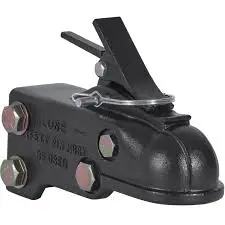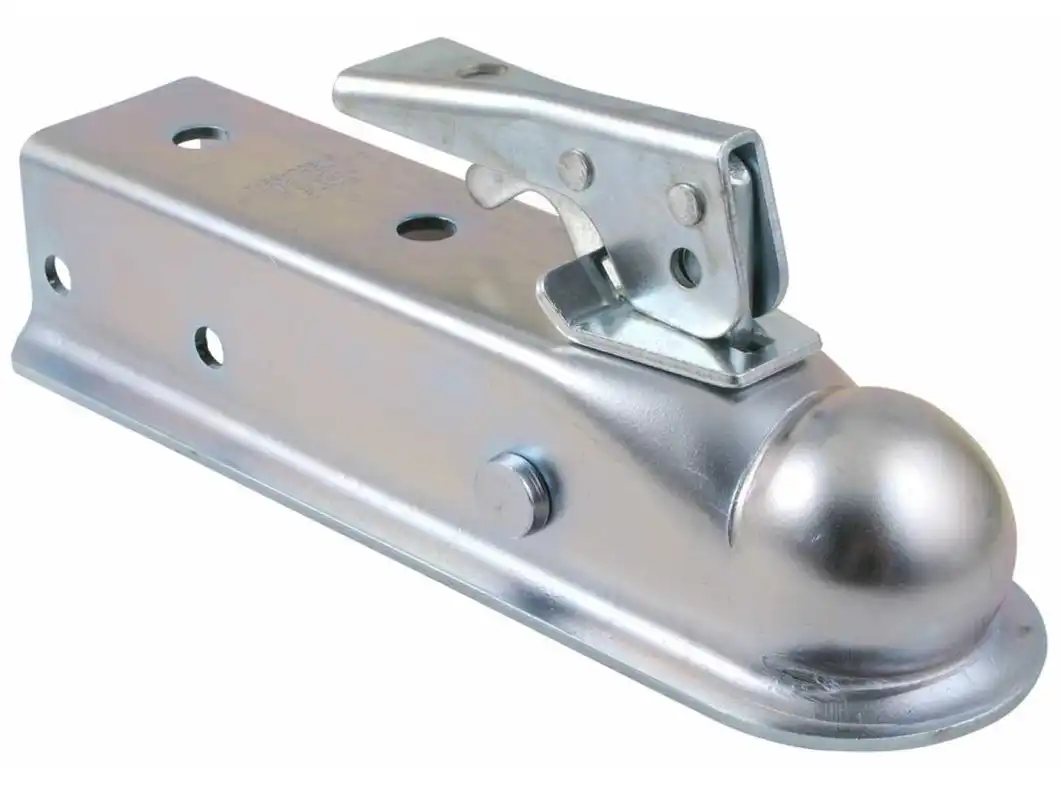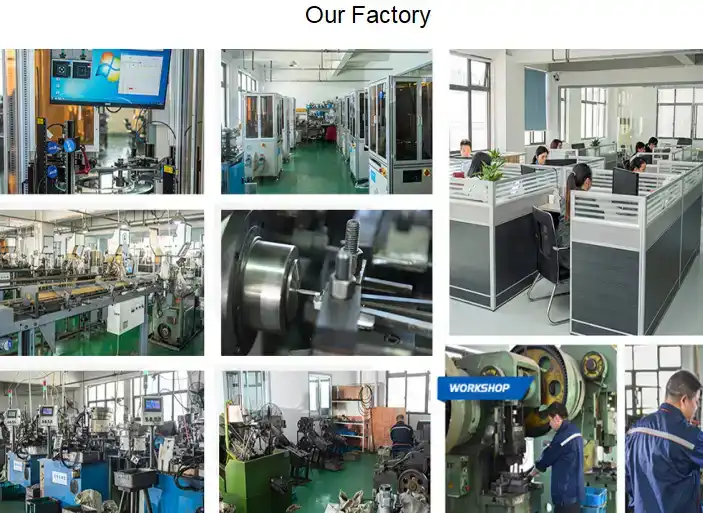The Ultimate Guide to Choosing the Right Heavy-Duty Trailer Coupler
2025-10-28 14:25:12
Picture this: you're hauling critical equipment across challenging terrain when suddenly your trailer becomes unstable, threatening both your cargo and safety. This nightmare scenario often stems from selecting the wrong Heavy-Duty Trailer Coupler for your application. Whether you're in construction, agriculture, or industrial transportation, understanding how to choose the right trailer coupler can mean the difference between safe, efficient operations and costly accidents that damage equipment and reputation.

Understanding Heavy-Duty Trailer Coupler Fundamentals
-
What Makes a Trailer Coupler Heavy-Duty?
A Heavy-Duty Trailer Coupler serves as the critical connection point between your towing vehicle and trailer, engineered specifically to handle substantial loads that exceed standard recreational towing requirements. These robust components are manufactured using high-grade materials such as forged steel or reinforced aluminum alloys, designed to withstand extreme stress, vibration, and environmental conditions encountered in industrial applications. The distinction between standard and heavy-duty couplers lies in their construction methodology, material thickness, and load-bearing capacity, with heavy-duty variants typically supporting gross trailer weights ranging from 10,000 to 30,000 pounds or more.
-
Essential Components of Heavy-Duty Couplers
Every Heavy-Duty Trailer Coupler consists of several integrated components working in harmony to ensure secure attachment and reliable performance. The coupler body forms the primary structure, featuring reinforced walls and precision-machined surfaces that accommodate the hitch ball. The latching mechanism, whether lever-actuated, screw-type, or innovative pin-based designs, provides the locking function that prevents accidental disconnection. Safety chains attachment points are incorporated into the coupler design, offering redundant security if the primary connection fails. Additionally, quality heavy-duty couplers include integrated safety features such as visual indicators confirming proper engagement and corrosion-resistant coatings that extend service life in harsh operating environments.
-
Load Rating Classifications and Standards
Understanding load ratings is fundamental when selecting a Heavy-Duty Trailer Coupler for your specific application. Gross Trailer Weight represents the total weight of the fully loaded trailer, including the trailer structure, cargo, and all accessories. Tongue weight, typically calculated as ten to fifteen percent of gross trailer weight, measures the downward force exerted on the coupler itself. Heavy-duty couplers must meet or exceed both ratings to ensure safe operation. Industry standards governed by organizations establish testing protocols and certification requirements, ensuring that rated capacities reflect real-world performance under dynamic loading conditions. Quality manufacturers like Qingdao RUIRUI Machinery ensure their couplers undergo rigorous testing to verify compliance with international quality standards.
Types of Heavy-Duty Trailer Couplers
-
Straight-Tongue Couplers for Industrial Applications
Straight-tongue couplers represent the most straightforward Heavy-Duty Trailer Coupler design, featuring a linear mounting configuration that bolts directly to the trailer frame. These couplers excel in applications requiring frequent hitching and unhitching, such as construction equipment transport and material handling operations. The design allows for quick engagement with standard ball mounts, making them ideal for fleets operating multiple trailers with varying loads. Manufacturing processes like progressive stamping and CNC machining ensure precise tolerances and consistent quality across production runs. When selecting straight-tongue couplers, verify that the mounting pattern matches your trailer frame dimensions and that the ball size specification corresponds to your towing vehicle's hitch ball.
-
A-Frame Couplers for Maximum Strength
A-Frame Heavy-Duty Trailer Couplers distribute towing forces across two frame rails, providing superior structural integrity compared to single-point attachment designs. This configuration is particularly advantageous for enclosed trailers, equipment haulers, and applications where lateral stability is paramount. The triangulated mounting arrangement effectively manages torsional stress encountered during cornering and uneven terrain navigation. Premium A-Frame couplers incorporate welded construction rather than bolted assemblies, eliminating potential failure points associated with fastener loosening. Advanced manufacturing facilities employ robotic welding systems to ensure consistent penetration and strength across all weld joints, meeting the exacting standards required for heavy-duty commercial applications.
-
Channel-Mount Adjustable Couplers
Adjustable channel-mount Heavy-Duty Trailer Couplers offer unparalleled versatility for operations requiring height adjustment to accommodate different towing vehicles or loading conditions. These sophisticated designs feature a coupler assembly that slides vertically within a reinforced channel bolted to the trailer frame, secured at the desired height with heavy-duty pins or bolts. This adjustability proves invaluable in mixed-fleet operations where various truck heights necessitate precise tongue height matching for optimal weight distribution and safe towing geometry. The channel mount design also facilitates easy coupler replacement without structural modifications to the trailer frame. Quality channel-mount systems incorporate anti-rattle mechanisms and corrosion-resistant hardware to maintain adjustment precision throughout their service life.
Critical Selection Factors for Heavy-Duty Applications
-
Material Composition and Manufacturing Quality
The materials and manufacturing processes used to produce a Heavy-Duty Trailer Coupler directly impact its performance, longevity, and safety characteristics. High-carbon steel provides exceptional strength-to-weight ratios and resistance to deformation under extreme loads, making it the preferred choice for maximum-capacity applications. Aluminum alloy couplers offer corrosion resistance and reduced weight, suitable for marine environments or weight-sensitive applications where load requirements fall within aluminum's capacity limits. Manufacturing quality encompasses precision stamping, proper heat treatment, and surface finishing. Reputable manufacturers employ deep drawing stamping techniques that maintain material integrity while achieving complex geometries. Secondary processes including powder coating, plating, or electrophoresis provide protective barriers against environmental degradation.
-
Mounting Configuration and Installation Requirements
Proper mounting of your Heavy-Duty Trailer Coupler is as critical as selecting the correct capacity rating, directly affecting both safety and coupler longevity. Bolt-on mounting configurations require precise alignment with trailer frame hole patterns, utilizing grade-eight fasteners with appropriate torque specifications to prevent loosening under vibration. Welded installations demand professional fabrication skills, ensuring full-penetration welds that don't compromise frame integrity or coupler strength. Consider the frame material and thickness when planning installation, as thin-wall tubing may require reinforcement plates to distribute mounting loads adequately. The coupler height relative to the trailer frame determines proper towing angles when connected to the hitch ball. Manufacturers like Qingdao RUIRUI Machinery provide detailed installation specifications and technical support to ensure correct mounting procedures.
-
Safety Features and Certification Standards
Modern Heavy-Duty Trailer Couplers incorporate multiple safety features designed to prevent connection failures and alert operators to improper engagement. Visual indicators, often incorporating color-coded elements, confirm that the latching mechanism has fully engaged the hitch ball, eliminating guesswork that could lead to dangerous situations. Positive-locking designs require deliberate action to release, preventing accidental disconnection from vibration or impact. Certifications from recognized testing organizations verify that couplers meet established safety benchmarks through rigorous evaluation. Quality assurance processes employed by certified manufacturers include dimensional inspection, material verification, and functional testing of every production batch. When sourcing Heavy-Duty Trailer Couplers, prioritize suppliers with documented quality management systems and traceability protocols that ensure consistent product performance.

Matching Couplers to Specific Towing Applications
-
Construction and Equipment Transport Requirements
Construction and heavy equipment transport demands place extreme requirements on Heavy-Duty Trailer Couplers, necessitating components engineered for maximum durability and reliability. Equipment haulers regularly navigate rough terrain, job site conditions, and loading ramps that subject couplers to multi-directional forces exceeding normal highway towing stresses. Select couplers with capacity ratings that provide adequate safety margins above your heaviest anticipated loads, accounting for dynamic loading during transport over uneven surfaces. Corrosion protection becomes particularly important in construction environments where couplers encounter mud, water, de-icing chemicals, and abrasive materials. The ability to perform quick visual inspections and maintenance is essential, favoring coupler designs with accessible lubrication points and easily replaceable wear components.
-
Agricultural and Farming Operations
Agricultural applications present unique challenges for Heavy-Duty Trailer Couplers, combining seasonal high-intensity use with extended storage periods and exposure to corrosive agricultural chemicals and organic materials. Farm trailers transport diverse loads from harvested crops to livestock, machinery, and bulk materials, requiring versatile coupler solutions that accommodate varying weights throughout the operational year. Seasonal maintenance becomes critical, with pre-season inspections ensuring that couplers remain serviceable after storage periods. The remote nature of many agricultural operations emphasizes the importance of coupler reliability, as breakdowns far from service facilities can disrupt time-sensitive operations like harvesting. Agricultural operators benefit from establishing relationships with responsive Trailer Coupler suppliers who understand farming timelines and can expedite replacement parts when needed.
-
Industrial and Commercial Fleet Operations
Commercial fleets operating Heavy-Duty Trailer Couplers face distinctive requirements centered on maximizing uptime, minimizing maintenance costs, and ensuring consistent performance across numerous trailers and operators. Standardizing coupler specifications across fleet inventories simplifies driver training, reduces parts inventory complexity, and streamlines maintenance procedures. Implementing scheduled inspection protocols helps identify wear patterns and potential failures before they result in roadside breakdowns or safety incidents. Fleet managers should consider total cost of ownership when selecting couplers, evaluating not just initial purchase price but also expected service life, maintenance requirements, and the manufacturer's technical support capabilities. Partnering with established manufacturers ensures access to replacement parts, technical documentation, and engineering support throughout the coupler's operational life.
Maintenance and Inspection Best Practices
-
Regular Inspection Protocols
Establishing comprehensive inspection protocols for your Heavy-Duty Trailer Coupler significantly extends service life while preventing unexpected failures that compromise safety and operational efficiency. Pre-trip inspections should include visual examination of the coupler body for cracks, deformation, or excessive wear, particularly in high-stress areas like the ball socket and mounting points. Verify that the latching mechanism operates smoothly without binding or excessive play, indicating proper adjustment and adequate lubrication. Check mounting hardware for tightness, looking for evidence of loosening such as elongated bolt holes or sheared fasteners. Safety chain attachment points require inspection for wear or damage that could compromise their emergency backup function. Document inspection findings systematically, creating maintenance records that track coupler condition over time and facilitate predictive maintenance scheduling.
-
Lubrication and Corrosion Prevention
Proper lubrication is fundamental to maintaining Heavy-Duty Trailer Coupler performance, reducing friction between moving components while providing corrosion protection. Apply high-quality marine-grade grease to the ball socket interior, ensuring complete coverage of contact surfaces that bear against the hitch ball during operation. Latching mechanism pivot points require regular lubrication to maintain smooth operation and prevent seizure that could make coupling or uncoupling difficult. Avoid petroleum-based lubricants that attract dirt and abrasive particles, instead selecting products specifically formulated for trailer applications that resist washout and maintain effectiveness across temperature ranges. In corrosive environments, consider additional protective measures such as sacrificial zinc coatings or regular application of corrosion inhibitors to exposed metal surfaces. Manufacturers like Qingdao RUIRUI Machinery apply advanced surface treatments including powder coating and electrophoresis during production, providing baseline corrosion resistance that proper maintenance extends.
-
Component Replacement Guidelines
Knowing when to replace rather than repair a Heavy-Duty Trailer Coupler is essential for maintaining safe operations and avoiding catastrophic failures. Structural damage such as cracks in the coupler body, bent mounting flanges, or deformation of the ball socket indicates that the coupler has exceeded its service limits and requires immediate replacement regardless of age or apparent remaining functionality. Excessive wear in the ball socket, evidenced by loose fit on the hitch ball or visible metal thinning, compromises connection security and necessitates replacement even if other coupler components remain serviceable. Latching mechanism wear that prevents secure engagement or requires excessive force to operate indicates the need for service, which may involve component replacement or complete coupler renewal depending on design and parts availability. Maintain relationships with reliable Trailer Coupler suppliers who stock replacement components and can provide technical guidance on repair versus replacement decisions.

Conclusion
Selecting the appropriate Heavy-Duty Trailer Coupler requires careful consideration of load requirements, application conditions, and quality standards to ensure safe, reliable towing operations. By understanding coupler types, material specifications, and maintenance requirements, you can make informed decisions that protect your equipment investment while maintaining operational safety.
Cooperate with Qingdao RUIRUI Machinary Co., LTD.
As a leading China Heavy-Duty Trailer Coupler manufacturer and China Heavy-Duty Trailer Coupler supplier, Qingdao RUIRUI Machinery delivers exceptional quality through advanced manufacturing capabilities including progressive stamping, CNC machining, and laser cutting. Our China Heavy-Duty Trailer Coupler factory maintains ISO 9001, ISO 14001, and OHSAS 18001 certifications, ensuring every Heavy-Duty Trailer Coupler for sale meets international standards. With competitive Heavy-Duty Trailer Coupler price structures and China Heavy-Duty Trailer Coupler wholesale options, we provide High Quality Heavy-Duty Trailer Coupler solutions backed by technical support and customization services. Contact us at info@qdkshd.com to discuss your requirements and discover how our expertise in metal fabrication, powder coating, and precision manufacturing delivers superior trailer accessories for global markets spanning over 80 countries.
References
1. "Understanding Trailer Coupling Systems for Industrial Applications" - National Highway Traffic Safety Administration, Transportation Safety Division
2. "Heavy-Duty Towing Equipment: Design, Testing, and Performance Standards" - Society of Automotive Engineers, Commercial Vehicle Engineering Council
3. "Material Selection and Manufacturing Processes for High-Capacity Trailer Couplers" - American Welding Society, Structural Welding Committee
4. "Safety Guidelines for Commercial Trailer Coupling Systems" - Commercial Vehicle Safety Alliance, Equipment and Cargo Securement Committee
Send Inquiry
You may like
